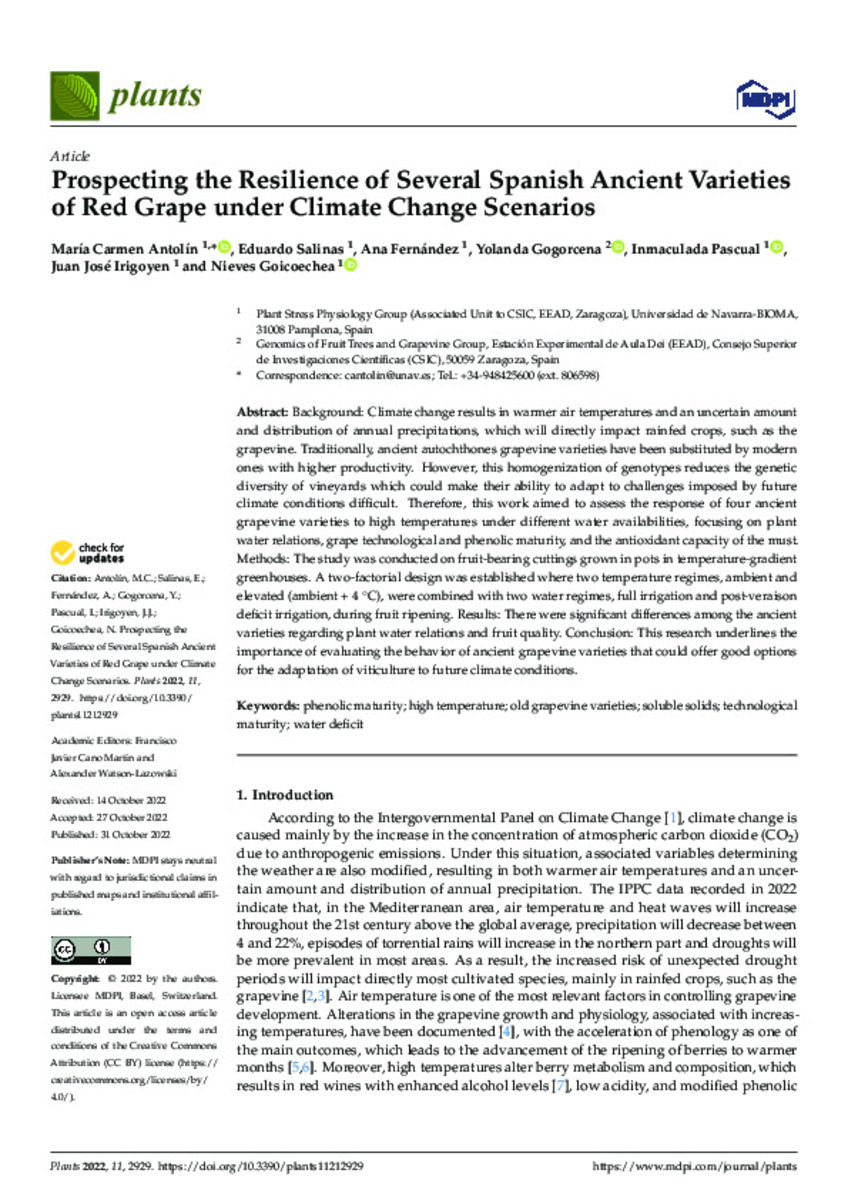Full metadata record
| DC Field | Value | Language |
|---|---|---|
| dc.creator | Antolin-Bellver, M.C. (M. Carmen) | - |
| dc.creator | Salinas, E. (Eduardo) | - |
| dc.creator | Fernández-Lesaga, A. (Ana) | - |
| dc.creator | Gogorcena, Y. (Yolanda) | - |
| dc.creator | Pascual-Elizalde, I. (Inmaculada) | - |
| dc.creator | Irigoyen, J.J. (Juan Jose) | - |
| dc.creator | Goicoechea, N. (Nieves) | - |
| dc.date.accessioned | 2022-11-07T10:30:46Z | - |
| dc.date.available | 2022-11-07T10:30:46Z | - |
| dc.date.issued | 2022 | - |
| dc.identifier.citation | Antolín-Bellver, M. (María del Carmen); Salinas, E.; Fernández , A.; et al. "Prospecting the resilience of several Spanish ancient varieties of red grape under climate change scenarios". Plants. 11 (21), 2022, 2929 | es |
| dc.identifier.issn | 2223-7747 | - |
| dc.identifier.uri | https://hdl.handle.net/10171/64602 | - |
| dc.description.abstract | Background: Climate change results in warmer air temperatures and an uncertain amount and distribution of annual precipitations, which will directly impact rainfed crops, such as the grapevine. Traditionally, ancient autochthones grapevine varieties have been substituted by modern ones with higher productivity. However, this homogenization of genotypes reduces the genetic diversity of vineyards which could make their ability to adapt to challenges imposed by future climate conditions difficult. Therefore, this work aimed to assess the response of four ancient grapevine varieties to high temperatures under different water availabilities, focusing on plant water relations, grape technological and phenolic maturity, and the antioxidant capacity of the must. Methods: The study was conducted on fruit-bearing cuttings grown in pots in temperature-gradient greenhouses. A two-factorial design was established where two temperature regimes, ambient and elevated (ambient + 4 °C), were combined with two water regimes, full irrigation and post-veraison deficit irrigation, during fruit ripening. Results: There were significant differences among the ancient varieties regarding plant water relations and fruit quality. Conclusion: This research underlines the importance of evaluating the behavior of ancient grapevine varieties that could offer good options for the adaptation of viticulture to future climate conditions | - |
| dc.description.sponsorship | This research was funded by Fundación Universitaria de Navarra (2018-21). Partial support was obtained from the Aragón Government (Group A09-20R) to Y.G. | - |
| dc.language.iso | en | - |
| dc.rights | info:eu-repo/semantics/openAccess | - |
| dc.subject | Phenolic maturity | - |
| dc.subject | High temperature | - |
| dc.subject | Old grapevine varieties | - |
| dc.subject | Soluble solids | - |
| dc.subject | Technological maturity | - |
| dc.subject | Water deficit | - |
| dc.title | Prospecting the resilience of several Spanish ancient varieties of red grape under climate change scenarios | - |
| dc.type | info:eu-repo/semantics/article | - |
| dc.description.note | This article is an open access article distributed under the terms and conditions of the Creative Commons Attribution (CC BY) licens | - |
| dc.identifier.doi | 10.3390/ plants11212929 | - |
| dadun.citation.number | 21 | - |
| dadun.citation.publicationName | Plants | - |
| dadun.citation.startingPage | 2929 | - |
| dadun.citation.volume | 11 | - |
Files in This Item:
Statistics and impact
Items in Dadun are protected by copyright, with all rights reserved, unless otherwise indicated.






